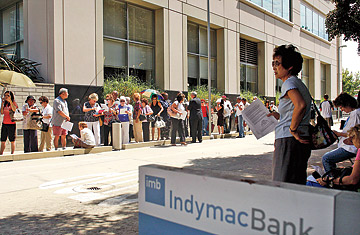
Endgame events always matter. the tumult of late 1968 defined that election for a generation. Gerald Ford sealed his fate with a gaffe about Eastern Europe in a 1976 debate, and Ronald Reagan never looked back after a strong performance in 1980's only presidential debate. But never has one eleventh-hour external event so transformed the trajectory of a presidential campaign.
Emerging from his spirited Republican Convention in early September, McCain was defying political gravity in a grim year for the incumbent party by surging in the polls. After months of relative confidence, Democrats were suddenly alarmed: Could they possibly blow yet another presidential election?
Then, on Sept. 15, everything changed. On that single day Lehman Brothers declared bankruptcy, Bank of America salvaged a troubled Merrill Lynch, the Dow dropped 500 points, and McCain famously declared that "the fundamentals of our economy are strong." It was the start of a big, bad political catastrophe for McCain and Republican candidates all over the country.
The drumbeat of bad economic news never let up through Election Day, drowning out any other message Republicans tried to deliver and blunting the impact of character attacks against Obama. McCain compounded his problems by lurching erratically from one posture to another on the economy, while Obama remained calm, cool and consistent.
Obama might have won the White House without the dramatic intervention of the economic crisis, but history will record that from Sept. 15 onward, Republican chances of victory plummeted — much like the value of a 401(k).